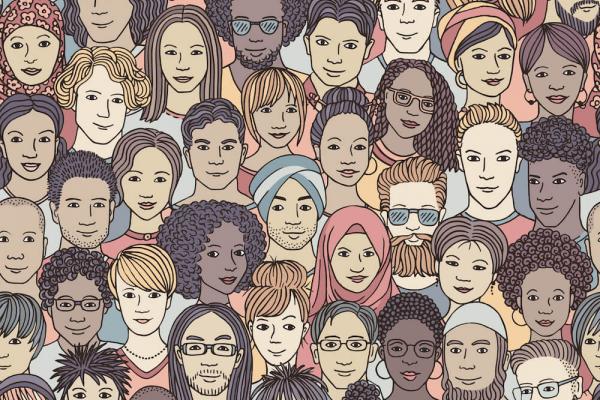Editors note: This is part two of an eight-part series exploring the eight Jesus questions all of us must face, highlighted in Jim Wallis's new book Christ in Crisis: Why We Need to Reclaim Jesus (HarperOne), available now. These next eight weeks will help us go deeper than the headlines, to find our way back to Jesus in the midst of this intensive and exhausting news cycle.
Want to hear this in an audio format instead? We just launched an eight-episode podcast series called Reclaiming Jesus Now that features Allison Trowbridge and William Matthews speaking with Jim Wallis about these questions and their relevance today.
Who bears the image of God? According to Genesis 1:26-27, each and every human being does.
“Then God said, ‘Let us make humankind in our image, according to our likeness; and let them have dominion [i.e., stewardship] over the fish of the sea, and over the birds of the air, and over the cattle, and over all the wild animals of the earth, and over every creeping thing that creeps upon the earth.’ So God created humankind in his image, in the image of God he created them; male and female he created them.”
The foundation of all human rights, equality, and dignity is all of us being created in the image of God — imago Dei. Seeing all people, no matter their race or ethnicity, gender, who they are, how they worship, or who they love, as full image-bearers of God undermines any human attempt to build barriers or divisions between groups.
This issue, about the image of God, is so morally foundational to everything we say and do in both our personal lives and in our politics that it must be raised again and again to remember and remind others what is at stake when we see God’s image being denigrated, devalued, or discarded. This has sadly become routine in American politics, with fresh examples in the news every single day.
The deliberately racialized dehumanization of indigenous people for their land, and of stolen Africans to justify our greed in slavery, was America’s original sin. Any form of racial discrimination based on that original dehumanization — in policing and incarceration, voting rights, education, economics, housing, the despoiling of land, and more — further perpetuates that sin. It is not just partisan politics for a party to deliberately and systematically seek to suppress minority votes; every vote suppressed is an assault on the image of God.
“I’ve done anti-voter suppression campaigns … and there’s something core about it … to not be able to vote, or to put a poll tax or something to hinder folks from voting, is telling them they don’t count as citizens, which means they're not full human beings,” William Matthews said on this week’s episode of the Reclaiming Jesus Now podcast, which focuses on this “Image Question.”
Indeed, when one people decides to have dominion, not just over the creation but over other people, it is an assault on the Creator, which attempts to overturn the purposes of God. Therefore, racism and other forms of human oppression based in identity are not simply morally wrong, they are sins against God and must be named as such.
As Christians, we are taught by the gospel of John that Jesus, the Word of God, was with God and was God at the moment of humanity’s creation. It is important to understand that relationship between Jesus Christ and the image of God. In fact, Jesus’ incarnation as both fully human and fully divine, and his entire life and ministry, proceed directly from God’s creation of human beings as bearers of God’s image. The radical love that Jesus embodies and teaches is a direct consequence of each and every person being a child of God in a very real sense — which makes us all siblings — as well as the love God showed us in taking on our form in Jesus Christ.
If we seek to be followers of Jesus, as well as faithful bearers of God’s image, anywhere in the world but particularly in the United States today, we must confront, repudiate, and repent of the evil of racism that is woven throughout almost every aspect of our society. White Christians, in particular, need to understand that it is their responsibility to dismantle white supremacy.
Structural racism is so deeply embedded in American society that it presents itself as an implicit promise made to white people in this country that, no matter their circumstance, they will always at least be treated better than people of color. For white Christians, our racist society presents a fundamental issue of obedience to God, or not, in our acceptance of all of these systemic structural realities. The illusion and idol of whiteness and the unearned privileges it confers is the core problem, and it’s an idol that is principally up to white people to tear down, as the ones who erected it and benefit from it.
“We are a multiracial, multicultural country and becoming ever more so, so every year, and [there’s] this deep underlying fear from those who have, for so many generations, benefited from the history of white supremacy in this country,” Trowbridge said in this week’s episode.
“There's [a] fear … that Trump has just so immediately tapped into and capitalized on.”
This is at the heart of the rise of Donald Trump.
Without going back through the list that marks the fundamentally racist nature of Donald Trump’s campaign, presidency, and reelection effort, what's at stake now is a president who is running on white nationalism. If we believe that our discipleship to Jesus Christ is fundamentally connected to the fact that all human beings bear imago Dei, white nationalism is anti-Christ, and until we talk like that, we're not dealing with the image of God.
When I discussed all this for the podcast with Allison and William, our discussion of the brazen and explicit nature of Donald Trump’s racism led William to share candidly with us what he and many other black people feel about this moment, but more broadly about what it feels like to live in America amid a system set up to oppress and exclude him and people who look like him:
“It’s like you don’t even have to say ‘send her back.’ I can feel ‘send her back.’ I can feel that in my chest. When certain policies are rolled out in a certain way, I can feel that … it’s all coded and it’s all guttural and it’s so embedded … People of color feel [that] on a guttural level … if y’all really had your way, I don’t think y’all would want us here. You’ve already used us as best as you can. Now you’re just trying to figure out a way to discard us,” Matthews said.
“And I think that’s what people color feel towards white people. And that’s what they see and that’s what they sense. And that’s what they feel on every level. Whether public policy, urban housing, or, or the economy conversation, or the healthcare conversation, or the all of it … And we're remotely just trying to take some measure of power back in that.”
I strongly believe that unless we are willing to hear each other’s hearts and deepest feelings, we can never make true progress in dismantling systems of oppression like white supremacy. White people need to understand, and I can testify from countless conversations over the last 50 years, that what William expressed to us in that conversation wasn’t unusual or unique.
That’s how most people of color genuinely feel, but it’s very difficult to feel safe speaking with that level of honesty in white spaces. When President Trump said that we want more immigrants from Norway, not from “s-hole countries,” how are people of color supposed to feel hearing that other than that it reflects the president and many white Americans’ belief — and more than belief, the all-too-prevalent reality, usually implicit but now explicitly trumpeted — that America has a preference for white people. It isn’t just words, it’s policies that show a preference for white people. And together they combine to make people who have been here their whole lives feel like this country isn’t for them.
William warned us in our conversation, “I feel that’s the crisis, but that’s also the opportunity as well … are you going to see my image?”
This challenge to dismantle white supremacy and build a beloved community is one that white Christians need to undertake for the sake of their own obedience to God. Those of us who are white need to realize that this challenge and calling isn’t for other people. It isn’t for people of color who white people need to help. Those of us who are white, coming to terms with this is for our own salvation, our own redemption from this lie, this sin, this ideology, this idol, which has crippled us as Christians. Until we who are white see our own salvation at stake, and stop thinking this is for other people who we want to help, we can’t credibly claim to be followers of Jesus Christ.
As Allison Trowbridge put in in our conversation, “Repentance needs to happen on a systemic level. Any white person in America has been a beneficiary of white privilege and of this history of racism.”
And as I’ve said before, to benefit from oppression is to be responsible for ending it.
Given these tough realities, where is a white person who wants to follow Jesus and honor the image of God in all people supposed to start in the monumental undertaking of dismantling white supremacy? William shared what I think is some of the best and most gracious advice I’ve ever heard, and I would encourage all of you reading this who identify as white to take it to heart:
“Show up. Don’t be quiet, show up. And if you mess up in that process, you're still loved. Keep showing up. If you don't say the right thing, that’s all right. It’s not even about saying the right thing. It’s about the attempt to show up, to stand for people, to openly encourage and also to push back on all that stuff. I think that’s real practical.”
Got something to say about what you're reading? We value your feedback!







